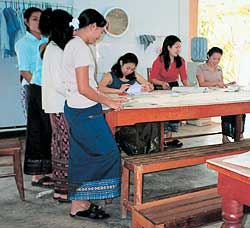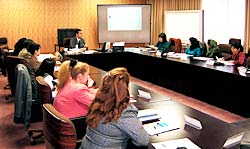![]()
Evaluation of Gender-Related ODA in Laos
In FY2001, the Ministry of Foreign Affairs commissioned Funabashi Kuniko, Coordinator of the Network of Asian Women's Councils (a former professor of the Women's Studies Center in Osaka Women's University) to conduct an evaluation of gender-related ODA in Laos as a third party expert.
The evaluation study of gender-related ODA in Laos, where Japan carries out a variety of ODA schemes in gender-related fields, was conducted with the theme advancement of the status of women and enhancement of gender equality in mind. This theme is regarded as one of the important issues in development assistance emphasized in both Japan's Official Development Assistance Charter and the Mid-Term Policy on ODA. The principal objective of the study was to gain suggestions for future assistance in these gender-related areas.
Rather than evaluating individual projects, the study considers a number of projects as part those, in effect, under of a single gender-related ODA program.
The targeted projects are listed below:
- (1)
- Project: Strengthening Lao Women's Union (LWU) on Management and Public Awareness on Gender Sensitive Issues in Laos (Japan WID Fund, 1998)
- (2)
- Project for Construction of Vocational Training Center for Women (in cooperation with grassroots grant aid, 1998)
- (3)
- Project for Construction of Literacy Resource Center for Women (in cooperation with grassroots grant aid, 1999)
- (4)
- Project to improve women's independence (Community Empowerment Program, 1998-2001)
These four projects have achieved desirable results in terms of women's empowerment, and the effectiveness, sustainability, and independent development of project implementation have been largely confirmed. However, the following have been suggested as possible issues for future consideration:
|
 Houey Hong Vocational Training Center for women - Training in pattern cutting |
Seminar on Promotion of Gender Equality II
The Cabinet Office and the Japan International Cooperation Agency (JICA) conducted a Seminar on Promotion of Gender Equality II over the one-month period November 17 through December 13, 2002.
This seminar has targeted officers from the national machineries of developing countries since FY1997, with the aim of contributing to women's empowerment by strengthening the functions of national machineries in each country. From this fiscal year onwards, the seminar will target officers at the division-director level, and the content has been enhanced by increasing the amount of discussion, and so forth.
This year's seminar was attended by thirteen participants from eight countries, comprising Afghanistan, Cambodia, Chile, Costa Rica, Fiji, Morocco, Paraguay, and Peru.
In addition to lectures on Japanese Government measures concerning the formation of a gender-equal society, an exchange of opinions with members of the Specialist Committees of the Council for Gender Equality, and lectures on measures taken by local governments, participants engaged in lively discussions among themselves, exchanging information and opinions on measures taken by the national machineries in their own countries and the status of measures dealing with issues pertaining to the multi-year work programme adopted by the United Nations Commission on the Status of Women.
 Participants from eight countries listening earnestly to a lecture on gender |
Seminar for Promotion of Education for Girls and Women
Under commission from the Japan International Cooperation Agency, the National Women's Education Center hosted a Seminar for Promotion of Education for Girls and Women over the four-week period February 12 through March 9. The seminar was attended by ten trainees from ten countries in Africa, Central America and Asia (Bolivia, Ghana, Guatemala, India, Indonesia, Malawi, Mozambique, Nigeria, Pakistan and Uganda).
In addition to providing trainees with an understanding of the current status of education for girls and women, and issues involved therein, and training in policies to promote education for girls and women, the seminar aimed to have trainees acquire the necessary information and mindset to formulate and implement policies that address gender disparities in access to education and the level of education attained in developing countries.
Trainees deepened their understanding of education policies that contribute to the advancement of women through lectures and discussions on Japanese education, education for girls and women, and other issues concerning girls and women; presentations of country reports; and visits to primary and junior high schools. A field trip to the Hiroshima Peace Memorial Museum provided a valuable experience for the trainees.
International Training Course on Processing Women's Information / International Forum on Women's Information
An International Training Course on Processing Women's Information was held at the National Women's Education Center during the period October 3~14, 2002. This program provides government officials and NGO supervisors in the Asian Pacific region with training in the processing of women's information. This fiscal year, the course was attended by 28 trainees from 20 countries, who actively engaged in workshops and seminars on information processing.
On October 12~13, an International Forum on Women's Information was held around the theme "Global Networking of Women's Information ・Beginning with information rooted in daily life". Following a keynote speech by Ms. Ochieng, Director of Isis WICCE (Women's International Cross Cultural Exchange) and a keynote report on a "Thesaurus on Women's Information" presented during the morning of October 12, the afternoon session was divided into three subcommittees where participants engaged in discussion. On October 13, specialists invited from overseas and coordinators of each subcommittee engaged in a panel discussion as panelists. Trainees on the abovementioned training course also participated in this forum, where an enthusiastic exchange of opinions on women's issues and the use of ICT ensued.
